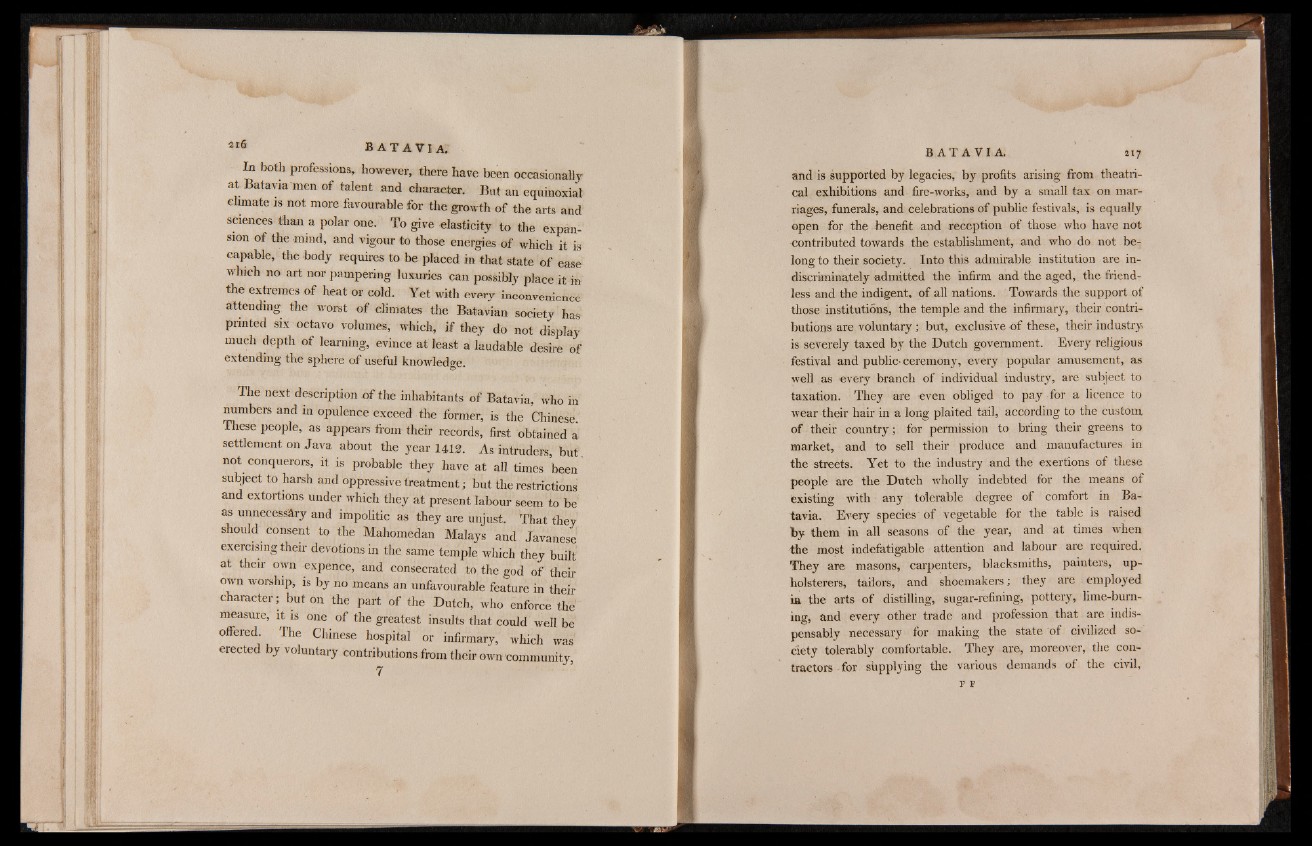
In both professions, however, there have been occasionally
at Batavia men of talent and character. But an equinoxial
climate is not more favourable for the growth of the arts and
sciences than a polar one. To give elasticity to the expansion
of the mind, and vigour to those energies of which it is
capable, the body requires to be placed in that state of ease
which no art nor pampering luxuries can possibly place it in
the extremes of heat or cold. Yet with every inconvenience
attending the worst o f climates the Batavian society has
pnnted six octavo volumes, which, if they do not display
much depth of learning, evince at least a laudable desire of
extending the sphere of useful knowledge.
The next description of the inhabitants of Batavia, who in
numbers and m opulence exceed the former, is the Chinese.
These people, as appears from their records, first obtained a
settlement on Java about the year 1412. As intruders, but
not conquerors, it is probable they have at all times been
subject to harsh and oppressive treatment; but the restrictions
and extortions under which they a t present labour seem to be
as unnecessary and impolitic as they are unjust. That they
should consent to the Mahomedan Malays and Javanese
exercising their devotions in the same temple which they built
at their own expence, and consecrated to the god of then-
own worship, is by no means an unfavourable feature in their
character; but on the part of the Dutch, who enforce the'
measure, it is one of the greatest insults that could well be
offered. The Chinese hospital or infirmary, which was
erected by voluntary contributions from their own community,
7 I
and is supported by legacies, by profits arising from theatrical
exhibitions and fire-works, and by a small tax on marriages,
funerals, and celebrations of public festivals, is equally
open for the benefit and reception of those who have not
contributed towards the establishment, and who do not belong
to their society. Into this admirable institution are indiscriminately
admitted the infirm and the aged,, the friendless
and the indigent, of all nations. . Towards the support of
those institutions, the temple and the infirmary, their contributions
are voluntary ; but, exclusive of these, their industry
is severely taxed by the Dutch government. Every religious
festival and public- ceremony, every popular amusement, as
well as every branch of individual industry, are subject to
taxation. They are even obliged to pay for a licence to
wear their hair in a long plaited tail, according to the custom
of their country ; for permission to bring their greens to
market, and to sell their produce and manufactures in
the streets. Yet to the industry and the exertions of these
people are the Dutch wholly indebted for the means of
existing with any tolerable degree of comfort in Batavia.
Every species' of vegetable for the table is raised
by them in all seasons of the year, and at times when
the most indefatigable attention and labour are required.
They are masons, carpenters, blacksmiths, painters, upholsterers,
tailors, and shoemakers ; they are employed
in the arts of distilling, sugar-refining, pottery, lime-burning,
and every other trade and profession that are indispensably
necessary for making the state of civilized society
tolerably comfortable. They are, moreover, the contractors
for shpplying the various demands of the civil,
V F